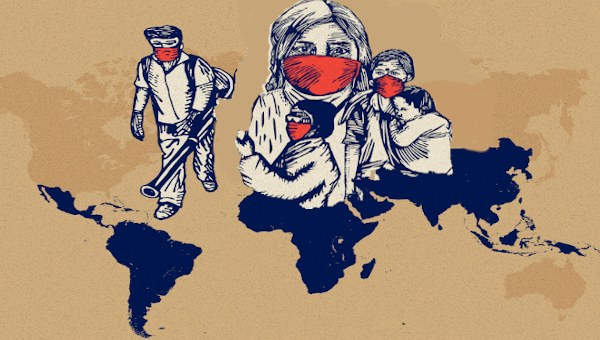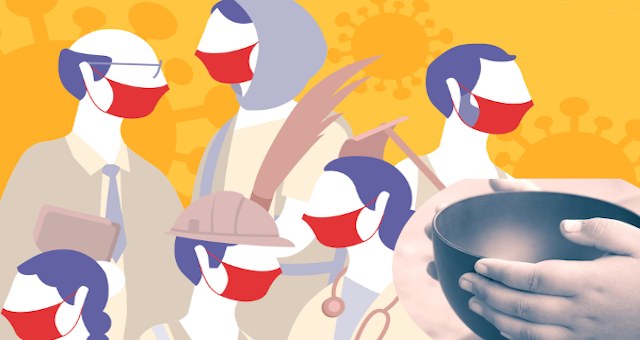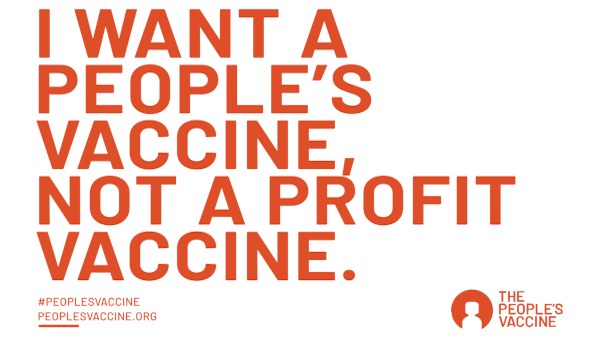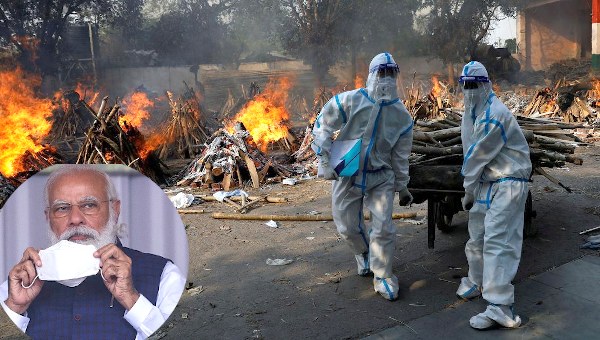South Africa: Vaccine Apartheid or Equality?
We are in the middle of a global shortage of supplies of COVID-19 vaccines. We are reliving the saga that happened early in the pandemic around access to personal protective equipment (PPE), where each country fought for its own patch. Getting the vaccine doses we require for South African healthcare workers is the most we can hope for in the coming weeks. Obtaining anything more within the next six months will be almost impossible for the majority of countries in the global South that did not, or were unable to, make pre-orders or payment commitments. South Africa might just possibly be the exception.

Understanding why we have got to the place where access to life-saving vaccines is out of reach to billions of people bears some scrutiny. But perhaps it would be relevant to start with some comments on the role that vaccines have played in bolstering public health systems.
The echo of denialism around their importance is prevalent across society, infecting even some in the government and, judging by the recent comments by Professor Barry Schoub in the Daily Maverick, some members of the Ministerial Advisory Committee (MAC) too. Prof Schoub says vaccines “are not a silver bullet.” Nobody is arguing that they are. But herd protection rather than herd immunity for the global population is not only possible, but particularly urgent given the emergence of new variant strains that are significantly more transmissible.
Global Threat – Global Solutions
Whether the South African strain creates more severe disease is still to be determined by our scientists. What we do know is that before the advent of the new variant it was estimated in studies cited by Oxfam that equal access globally to COVID vaccines can save 50 per cent of all anticipated deaths.
We are facing a global threat in the league of the climate crisis, if you like, an early warning system of ecological breakdown. And like with the climate crisis, only solutions that are global can provide the protection needed to save lives. This requires a high degree of international burden sharing, solidarity and cooperation.
This, I believe, is the emerging consensus by leading public health officials around the world. Herd protection without a wide vaccination rollout in South Africa would only be possible if we closed all our borders for the next few years. This is not an option for many reasons, not least the utter lack of humanity involved in shutting out people from bordering nations who are also victims of unequal access to drugs and treatment.
In this sense, I would argue we need a regional plan that puts vaccine acquisition and rollout front and centre and brings all those to the table who have the experience and expertise to make this happen, within the shortest possible time frame.
The Argument for Vaccines
Vaccines of one form or another emerged early on in the development of natural sciences. Only in one instance has a vaccine completely eradicated a disease, smallpox, which claimed hundreds of millions of lives. That said, they have largely controlled many other diseases worldwide: rubella (German measles), polio, hepatitis A and B, influenza. The list is long and the reach of vaccine technology has been global.
Vaccine research and development began to take off in the late 1800s and early 1900s, with major outbreaks of disease wrought by squalid housing conditions in the advent of industrialisation. It then leapfrogged further in the post World War 1 period, in the wake of the devastation of the 1918 Spanish Flu. In the post World War 2 period, the charge was led primarily by the United States, followed closely by northern Europe. Nation states with the capacity had manufactured vaccines for diseases that presented a global health threat and did so in cooperation with one another.
But by the 1980s things began to change. Neoliberalism saw the outsourcing of such vaccine research, development and production to big pharmaceutical companies, whose massive profit levels resulted in perhaps the strongest political lobbying power worldwide, a lobby designed primarily to protect and enhance their huge profits through the patents they registered. The 1995 World Trade Organisation (WTO) Treaty on Trade-Related Aspects of Intellectual Property (known as the TRIPs agreement), is one outcome of this lobby. As a member of the WTO, South Africa is bound by this agreement. However, a proposal made by South Africa that, in the context of the COVID crisis, countries be allowed a waiver from certain aspects of TRIPS can be found here.
Consequently, one and half million people die annually because of lack of access to vaccines, while tens of millions of children still do not have access to immunisation. Market failure in vaccines is borne out by the fact that, as recently as 2017, low- to middle-income countries (LMICs) accounted for 79% of the global market vaccine sales volume, and yet only 20 per cent of the actual total value. Effectively, despite the level of need, poor people simply do not present a profitable enough market to drive the investment and production required. The reasons may seem obvious given the high price demanded for many vaccines, but it is not.
The Role of Big Pharma
Social historian Prof Mike Davis has shown that big pharma largely only enters into vaccines and therapeutic treatment research and development (R&D) for diseases that are either more prevalent in richer countries, and/or require repeat treatment. These medicines are often very expensive and limited to those with private healthcare, or to those public sector hospitals where nation states can afford the stock.
Davis concludes that big pharma, in this context, has acted to put the brakes on the revolutionary bio-medical technological advances within society’s reach. Into the breach have stepped the universities, the National Health Institutes and US Centres for Disease Control (CDC). These have pioneered medical R&D, perhaps most prominently within the US.
Yet while biomedical R&D at universities has been partially funded by medical corporations, this is not the case for research capacity within the state.
State funding for medical research around infectious disease has been eroded drastically over the past decades, and in terms of pandemic preparedness programmes in the US, have been sliced to the bone by Donald Trump. It’s time to jettison the rhetoric on incentivising innovation when it comes to medicine. Big pharma has largely been relegated to the supply and distribution of vaccines and treatments required globally. According to Davis, in an interview I conducted, much intellectual property (IP) developed for tropical disease, for instance, has been developed on the back of public investment. This tendency is nowhere more clear than the COVID-19 vaccines which have seen all the major candidate vaccines that have been approved, de-risked almost entirely by the initial massive investment by the American and European taxpayer.
Public-private partnerships and philanthropy, while they have proven critically important in the battle against HIV, are wholly insufficient to contain global pandemics such as COVID-19. That is not to say that we don’t require everyone to roll out plans that have the ability to succeed. This is particularly important in a context such as ours, where the state lacks capacity and displays pride and arrogance. What we need is humility and an admission that our political leaders do not have the capacity to deal with this crisis.
Genuine participation by all those who have something to offer must be built into our state-led response immediately.
The Public Cost of Patents
By the end of 2020, the confirmed global COVID-19 death toll sat at more than 1.8 million people; while most speculate that sadly, the real number sits far higher. Fortunately, given our robust reporting system in South Africa, we have no such need to speculate. For example, SA’s Medical Research Council (MRC) meticulously records all deaths and therefore is able to quantify excess deaths in the time of COVID; many countries, including other members such as BRICS, do not have systems comparative to our own.
South Africa’s own death toll, from 6 May to 8 December 2020, is estimated to have stood at 60,000 when one takes into account excess deaths. The emergence of the new variant that is far more transmissible will undoubtedly continue to overwhelm our health service. My own estimate, given the combination of higher infection rates and a collapsing healthcare service, unless we institute a massive vaccine programme, deaths in 2021 could double, possibly treble, the death toll we have experienced in 2020. This is based on the assumption that we do not get a vaccine rollout that covers at least 50% of the population by June or July this year.
This grim situation could very well get worse if our healthcare workers and the most vulnerable persons do not receive any protection in the coming weeks — or certainly within the first quarter of this year. Phase 1 of the government plan to roll out vaccines, designed to protect healthcare workers, seems possible and likely to happen if the government responds with urgency and vigour. Yet, even this limited rollout will require the involvement of all those with the expertise, direct interest and goodwill to shape the plan, so we can ensure that the state-led rollout with the huge logistics involved happens as efficiently and rapidly as possible.
The major and more difficult task of protecting essential workers, those over 60, the millions with co-morbidities, demanding tens of millions of doses, is physically near impossible to meet within the current constraints.
It is simply out of reach for most of the world at present.
Civil Society Mobilises — Again
The Treatment Action Campaign (TAC), SECTION27 and others, several years ago launched a coalition to pressure the SA government to Fix the Patent Laws. Success would insure that we would not have to undergo a replay of the long and bitter campaign to get access to anti-retroviral medicines for HIV that saw hundreds of thousands of lives unnecessarily lost in the 1990s and 2000s. The ultimate argument of the campaign is that South Africa needs to adjust its patent laws to the South African Constitution, which provides “everyone with the right of access to healthcare services.”
The logical force of the Fix the Patent Laws campaign has undoubtedly helped to inform South Africa’s joint motion with India that calls for a waiver on the TRIPS agreement to the WTO. In short, this would allow for the sharing of intellectual property around COVID-19 vaccines. The motion has the support of 140 countries, but is being opposed by a club of nations that continue to rule the world and are accompanied by allies such as Brazil’s president Jair Bolsonaro. Resolution seems unlikely.
At present, all that’s been brought to the table from AstraZeneca for Brazil and India are preferential price deals for the manufacture of vaccines. In similar such deal, Pfizer’s CEO has also apparently (some months ago), offered discounted prices to South Africa. According to some reports, CureVac, another front runner in vaccine production, is exploring a deal with South African-born and raised Elon Musk to establish mini-factories around the world to produce their vaccine according to vaxmap.org.
There is a need to meet global demand in a rational and equitable rollout in early 2021. To do so requires nothing less than manufacturing and supply to be massively expanded to all those countries that have the capacity to undertake such a task.
South Africa, unfortunately, does not have the capacity to manufacture COVID vaccines, despite a public-private partnership established for this purpose over 20 years ago, a story in its own right. COVID will linger for years to come and therefore it would be expedient for us to develop this wasted capacity rapidly.
Resolution of the supply question that is being battled out at the WTO in terms of the TRIPS waiver will need to be rapidly assessed. Countries like ours have the legal (and moral) right, as embedded in our Constitution and past judgments of our Constitutional Court around access to medicines, to protect the right to health and life itself. It will become clear in the next few days and weeks whether this requires our country to issue compulsory government licenses to force the sharing of IP.
In recent interviews, I was informed that a deal with Johnson & Johnson is still on the table and being negotiated. Their application has been lodged with SAHPRA and phase 2 final results have been submitted for consideration, but final local regulatory approval may very well take another month or so. If this is so, then there may be some hope on the near horizon.
We have to start planning for this contingency. A rollout plan that involves key players from across civil society, including distribution logistics from the private sector, needs to begin as of yesterday. It will need to be stress-tested and bulletproofed if we are to stand any chance of finishing all three phases of the planned rollout of vaccinations by 2021.
It would be a grave mistake for this rollout to sit within one department given the enormity of the task and rather poor track record to date.
We cannot leave this fight for access and genuine participation in the vaccine rollout to the health NGOs, social justice organisations and the likes of Oxfam or MSF alone. All our trade unions, democratically run civic organisations, churches and political parties have a huge responsibility to stand up now and be counted at this moment of need for our country and indeed the majority of the world’s population. In such a battle, local and international solidarity will be key to any victory.
An extraordinary effort is required on all moral and political fronts, by the South African government working hand in hand with its citizens. Our efforts to ensure IP is shared will require the active solidarity and support of many millions around the world if we are to achieve some degree of success in 2021.
But first, we need to get the government and others to actively support the call for vaccines to be seen as a public good — outside of the polite setting of the World Trade Organisation — and this requires nothing less than significant pressure from those quarters of our society that have organised constituencies. Efforts are under way, but there is a long way to go. •
This article is informed by and grateful to the following scientists who have been interviewed for my forthcoming documentary, The Time of Pandemics: Mike Davis, Dr Larry Corey of HVTN, Dr Tony Fauci of NIAID, US; Prof Glenda Gray, Dr Aslam Dasoo, Prof Shabir Madhi.
This article first published on the Daily Maverick website.
Toward a People’s Vaccine Campaign – A Call to Action
The COVID-19 pandemic is wreaking havoc in South Africa and globally, millions are being infected and dying. Vaccinating a significant part of the population is the only realistic way to defeat the pandemic. Achieving this will require international co-operation and solidarity, while unity in action across all sectors of our society is now urgent. We need vigilance and solidarity to slow the rate of infection and to ensure that health facilities are not overwhelmed.
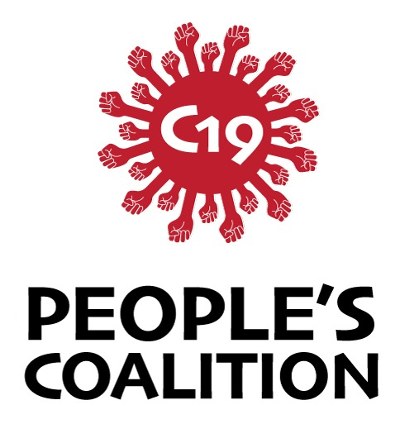
The reported acquisition of 1.5 million doses of C-19 vaccines for frontline healthcare workers is welcomed, but this must be the start of urgently acquiring millions more. It is estimated that between 40 to 80 million doses will be needed, along with a massive roll-out effort to achieve herd immunity. This cannot be done by the government alone. We, the people, especially the millions of poor and working-class people, must be central to this effort.
A People’s Movement for the Vaccine
This call to action arises out of a broad-based demand for urgent mobilisation to ensure equitable vaccine access and allocation, which is endorsed by over 500 organisations and individuals, who now raise a call for the creation of a People’s Vaccine Campaign. It is inspired by the People’s Vaccine Alliance and Free the Vaccine campaigns globally.
Our government’s poor record of public service delivery, widespread corruption and mismanagement, as well as the profiteering by the pharmaceutical industry, private healthcare and other corporate interests are key contributors to the dire state of our health system, as well as risks to the equitable vaccine access required. While recent lack of transparency about the vaccine plans and delays in securing access to supplies have built little trust.
A people’s movement must participate actively in the discussions to shape and provide oversight to the national vaccination roll-out programme. The role of labour (especially front-line workers), civil society, social movements, communities and people’s organisations is crucial to defeat the pandemic.
Why Do We Need a United Response?
1) SA’s Unequal Health System(s)
SA is the most unequal country in the world. Our healthcare system(s) symbolize this with half of our healthcare expenditure serving only 16% of the population. The other half covering 84% of our people, mainly the poor and black working class. While the combined resources of both are critical to the success of a People’s Vaccine Campaign, without collaborative coordination free from predatory and profiteering practices, we will not see the end of this pandemic.
2) Gendered Disparities
Women generally carry the greater burden of health and care in society, and also suffer disproportionately from illness, poverty and violence. Continued delays in the vaccine roll-out risks deepening the gendered divide, and increasing both their exposure to the virus and burden of responsibility for caring for their family in the event of infection and death.
3) Austerity in a Pandemic is disastrous
The scale of the required roll-out requires massive funding for the public health system. Yet, the government remains committed to austerity, with National Treasury cutting R3.9-billion in real terms from Public Health budget in February 2020. While 2018 estimates put vacancies in the public health system at 37,000, those won’t be filled with such drastic cuts in the budget.
4) The Agreement on Trade-Related Aspects of Intellectual Property Rights (TRIPS)
The World Trade Organization (WTO) maintains patent monopolies, controlling information about how to make the vaccine. This prevents SA and others from being able to make and distribute affordable vaccines. TRIPS must be suspended for all vaccine-related information.
5) Vaccine Nationalism and Xenophobia
Many countries are addressing the pandemic on a narrow, nationalist basis. Wealthy nations in Europe, Canada and the USA have pre-ordered large numbers of vaccine doses which exceed the need of their own populations. Some countries are refusing to vaccinate migrants and asylum seekers or populations under their occupation. The vaccine must be for all of us.
6) Community Healthcare Workers (CHW)
Thousands of CHWs have been recruited, but their employment is insecure, irregular and low-paid. The majority of CHWs are women who are overburdened, with precarious employment. They must have immediate vaccine access and guaranteed job security.
7) Disinformation and Vaccine Skepticism
The rise of misinformation, science denialism, anti-vaxxer sentiments and vaccine hesitancy presents an incredibly worrying picture. While skepticism of government, the pharmaceutical industry and of the private health sector has created fertile ground for opportunism and fear-mongering.
Toward a People’s Vaccine Campaign
We are building a campaign to ensure equitable access to vaccines for everyone. Without widespread vaccination, we will not be able to end this pandemic. We must:
Pressure the Government to Build the Public Health System and Reverse Austerity
There must be increased health spending to build the capacity of the national health system, and National Health Insurance (NHI) to ensure decent and equal healthcare for all.
This includes full-time public sector employment for CHWs and the appointment of additional nurses. The terms and conditions of the 2018 PSCBC collective agreement should be restored. In addition, in face of the socio-economic impact of COVID-19 and inequality in our country, the implementation of a Basic Income Guarantee (BIG) is now nothing less than a dire necessity.
Mobilise Civil Society to Demand Meaningful Representation
We must lobby for the inclusion of civil society and communities in various stakeholder forums where plans for the roll-out of vaccines are being formulated. We can campaign and educate communities about vaccines as well as monitor implementation to call out any form of inequity, unfairness, corruption, theft, mismanagement or even inefficiencies.
Combat the Wave of Anti-Vaccine Disinformation
We learnt with HIV/AIDS that disinformation amidst distrust, uncertainty and fear costs lives. This requires national information and educative engagement on all platforms. Lives now depend on building public health education in many languages and with many stakeholders.
Support Price Regulation, Control and Price Transparency of ALL Vaccines
We support measures that seek to ensure that the WTO, rich countries and the pharmaceutical industry do not continue to enforce Intellectual Property laws, patent and pricing barriers that undermine universal access to vaccines, and thereby also limit mass immunization.
We support the call for the vaccine to be declared a ‘public good’. •
This article first published on the C19 Peoples Coalition website.
SAFTU Warns the Treasury to Stop Frustrating Efforts to Provide Vaccines
The South African Federation of Trade Unions (SAFTU) has taken notes of media reports – especially a Business Day interview of Treasury Director General Dondo Mogajane (18 January) – suggesting we will face an increase in taxes next month when the budget is announced, to pay for COVID-19 vaccines. The interview included Mogajane’s admission, “South Africa will not take us seriously if I can find money for SAA but not for vaccines.”
This interview seems to be damage control, because it comes on the heels of a Financial Mail report (14 January) which unveiled how, in reality, the Treasury is hellbent on undermining efforts to halt COVID-19:
“the Treasury was not convinced that a large volume of vaccines would be necessary. At the time, two studies on immunity in the Western Cape and Gauteng had just been released. They suggested that, given the significant antibody levels present in 30%-40% of the population in the two provinces, a ‘natural immunity’ was being built. In the Treasury’s view, if this was indeed the case, ‘why waste money on vaccines?’ a source says.”
We do not believe the quote is fictional, because the FM is very close to Treasury. If true, this is yet another demonstration that our neoliberal economic policy makers are completely indifferent to the suffering of the masses of the people. The loyalty of the Treasury, as Mogajane has repeatedly made clear, is to the New York credit rating agencies and the IMF, whose policies have inspired austerity in a South Africa that is already the world’s most unequal country.
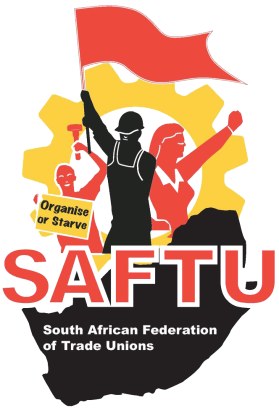
SAFTU rejects any attempt to increase the burden the poor are already carrying through twenty-five years of neoliberalism and now austerity programmes. We suspect that the preferred tax increase for this ultra-conservative Treasury will be the Value Added Tax (VAT).
If this were to happen, it would be the second VAT increase in recent years, for in 2018, Finance Minister Malusi Gigaba raised the rate from 14% to 15%, although some additional zero-rated relief on essential products was provided as a result of social protest. The VAT is a regressive tax system that punishes the poor more than the rich, because aside from those zero-rated products, the amount of tax spent as a proportion of income by poor people is far higher than that spent by the rich.
Instead of increasing the VAT, the government should be putting far more efforts into acquiring a cheaper, generic vaccine; increasing the taxes on the rich and on corporations; halting Illicit Financial Flows by tightening exchange controls, along with lower interest rates and tighter exchange controls; and using Reserve Bank “Quantitative Easing” financial support to Treasury bonds, along with prescribed asset requirements on institutional investors.
Our explanation should be common sense in society. Above all, we need cheaper medicines because Big Pharma always price-gauges when it has illegitimate Intellectual Property to defend. For three reasons, we consider these to be illegitimate super-profits:
- first, so much public money has gone into subsidisation of the vaccine and treatments for COVID-19,
- second, most Western countries are selfishly ordering vaccine treatments to cover more than the number of people who live there (Canada by five times), generating a vaccine apartheid where white skins and fat wallets determine whether we live or die, with Big Pharma directing a vastly disproportionate share of its vaccine output to the West; and
- third, because this is a global emergency in which already at least two million are dead, perhaps three if ‘excess’ deaths are included.
In the case of highly-contagious COVID-19, even more so than with our prior pandemic, AIDS, an injury to one is an injury to all. The extremely rapid spread of the variant that first appeared in the Eastern Cape and is now in 20 other countries, suggests that the lesson from the 2001 Doha Agenda must be relearned: the exemption of AIDS medicines from the Trade Related Intellectual Property System. That exemption allowed generics to be provided free through our public health system and raised life expectancy from 52 to 65 years.
To be sure, Treasury does not control the World Trade Organisation negotiations, but it is a shame President Cyril Ramaphosa has not provided public education here, nor publicly campaigned on behalf of the South African-Indian challenge to Big Pharma’s IP. As outgoing head of the African Union, global vaccine justice along and the failure to support – much less achieve – cancellation of Africa’s massive foreign debt, will be considered his biggest missed opportunities.
The WTO Council meeting on January 19 should be one where rich countries change their stance on making information available for all countries to move toward rapid generic vaccines and treatments!
But we must also put more pressure on Treasury, simultaneous with the campaign for generic vaccines. SAFTU will be protesting against Treasury on 24 February, and we reiterate the calls made countless times for the following taxes to be introduced.
- Tax corporates and the rich! SAFTU insists on reversal of corporate tax cuts, ending absurd loopholes and setting the primary tax rate back to where it was in 1992: 52% (up from 28% at present). And the personal tax rate of 45% paid by rich individuals is not high enough to achieve redistribution, given the huge benefits they receive from residual apartheid privileges, including ultra-cheap labour in their homes, gardens and private security forces. Raising these rates will expand fiscal resources that we so desperately need to rebuild our state to provide effective services for all, to provide a Basic Income Grant, as well as to redirect funds that can help localise our economy and restore our industrial base.
We insist that in the world’s most unequal society, at a time inequality is soaring due to the pro-rich character of the lockdown, it is vital to raise the level of fiscal support through progressive taxation of both income and wealth. We anticipate a much greater multiplier effect if poor people have more to spend, since they import less than the rich do, and don’t sneak it out of the country into favoured tax havens or overseas stock markets.
- The debt/GDP ratio can rise, if funds are well spent! Government still pursues the objective of lowering the debt/GDP ratio, even though GDP has collapsed (probably by at least 8% in 2020 with no real end in sight to stagnation and decline). Tax revenues have fallen even further, by R300 million, pushing the public debt even higher. Nevertheless, the debt to GDP ratio is inappropriate as a measure of our ability to solve problems with state programmes.
South African debt is not out of control, and no country facing this magnitude of underdevelopment ever embarked on a programme to keep debt to GDP ratio at the current levels, especially when an unprecedented economic depression has hit us, what with recession characterising the majority of quarters since Ramaphosa took power in 2018. While the ratio appears to exceed 80% at present, up from 26% at its low point in 2008 before the prior world capitalist financial meltdown, there have been periods in history with much higher ratios.
In 1932, debt/GDP ratio was 125%, yet the decade that followed witnessed an exceptional growth in state activity, such as the introduction of major parastatal agencies and an active industrial policy that raised GDP by an average of 8% annually from 1933-47. (Because of the overall rise in state activity plus increasing labour-intensive manufacturing due to import-substitution, even the black wage rate rose more rapidly during this period than at any other time in the past century.)
In contrast, the current government’s austerity, aimed at meeting artificially-low debt/GDP levels, means Treasury is reducing expenditure by R21-billion in 2020/21 and 28.5-billion in 2021/22, plus cutting civil servant wages by more than R50-billion annually. If instead, Treasury considered a full accounting of the public sector ‘balance sheet’ to include our state’s mineral wealth, then as the International Monetary Fund noted in its October 2018 Fiscal Monitor, South Africa is the sixth most wealthy major state in the world whose full balance sheet could be measured at that time. It should be our wealth, not our income, that helps Treasury expand expenditure.
- Demand patriotism by the wealthiest and prevent their economic sabotage! Introduce a wealth tax on the top 0.1% immediately, given that these 35,000 South Africans have witnessed a rise in their share of the country’s wealth from 18% in 1994 to 30% in 2019. But given the lack of patriotism by the mainly white elite, additional decisive steps must be taken to retain our economic sovereignty – such as capital controls and prosecution of corporate thieves – to thereby halt illicit cash outflows, tax dodging schemes, tender fraud and corruption.
In the PwC 2020 assessment of the world’s most economically-criminal elites, India’s corporate class ranked first, with South Africa tying with China for second. Government knows well that corporations’ cream off 35-40% extra on the average procurement contract, as Treasury officials will admit, but they have done nothing to stop this. The COVID-19 looting spree by cronies of the government, and the ability of firms like Dis-Chem to price-gauge consumers, are only the tip of the iceberg. Steinhoff, Tongaat Hulett and VBS criminals still walk free, as the National Prosecuting Authority allows white-collar tsotsis enormous latitude: among nearly 220,000 cases successfully prosecuted in 2019-20, private-sector corruption numbers only 233.
There must be a tightening of exchange controls to halt this extreme form of economic sabotage. In 2019 the Treasury’s Financial Intelligence Centre recognised that 3-7% of our GDP is flooding out in the form of Illicit Financial Flows. This must come to an immediate halt, so that there is more funding available in South Africa that in turn can support vaccine acquisition.
The private sector funding we anticipate will be available, should include a cross-subsidisation from the vast private health insurance surpluses that have built up, since so much expensive hospital care for non-COVID-19 patients, especially elective surgery, did not occur in 2020. Health financing apartheid must end, and this is a no-brainer since if we acquire vaccines for all, the terrible burden of disease that caused so many COVID-19 hospitalisations and fatalities will be less destructive.
- Use the Reserve Bank’s Quantitative Easing capacity. There are many economists dedicated to “Modern Monetary Theory” who now convincingly argue that where there is no threat of inflation – and South Africa’s dipped to just 2% last year – there should be more willingness to boost the economy using central bank powers. These including “priming the pump” in the government’s bond markets, as did the SARB in March-April 2020, with a bit more than R10-billion. But a former Treasury deputy director general recommended this be raised to R20-billion per week, and one of Investec’s leading economists is also very critical of the SARB’s unwillingness to fund state spending.
We think the Treasury and SARB should follow the kind of policy the incoming US president Joe Biden is about to introduce on Wednesday, making good on a pledge to give $2000 (R30 400) to each adult earning less than $75,000, as an economic stimulus and support to their households’ survival. This, in addition to funding vaccines, would help our society get through this period of socio-economic catastrophe.
We invite any politicians and officials in Treasury who have any disagreements with us, to speak up and explain why the country’s richest (and in most cases white) beneficiaries of Treasury generosity should not be asked to sacrifice, at long last.
If not, the idea that “South Africa will not take us seriously if I can find money for SAA but not for vaccines,” will be the basis for much more than disgust: we will be on the streets of Cape Town outside Parliament protesting Treasury with all our energies on February 24, if COVID-19 doesn’t fell us first. •
This article first published on the SAFTU website.


